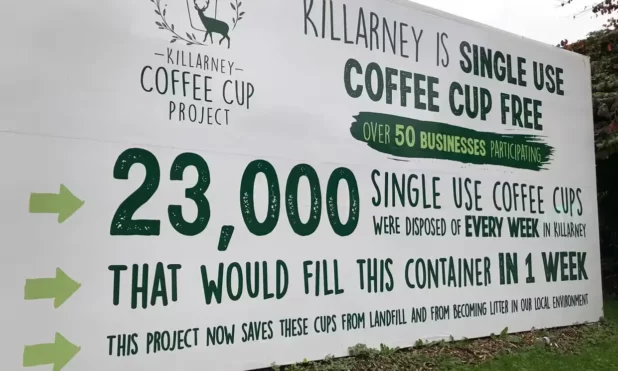Related: Shock as Retardo Paper Straws Actually More Toxic Than Plastic
Leave it to the Irish to be on the forefront of the latest retarded nonsense.
I actually support this, but it’s still gay.
Killarney used to accept it as a price of being a tourist town: ubiquitous disposable coffee cups spilling from bins, littering roads and blighting the area’s national park.
The County Kerry town went through about 23,000 cups a week – more than a million a year – adding up to 18.5 tonnes of waste.
Not any more. Three months ago, Killarney became the first town in Ireland to phase out single-use coffee cups. If you want a takeaway coffee from a cafe or hotel, you must bring your own cup or pay a €2 deposit for a reusable cup that is returned when the cup is given back.
The results are evident in bins, which now seldom overflow, and on streets and forest trails where it is rare to see abandoned cups.
“It was a plague on the town and countryside,” said Michael Gleeson, chair of the group Killarney Looking Good, that promotes civic improvements. “This was a wonderful and necessary initiative. The amount of cups strewn around is considerably reduced.”
On a stretch of the N22 road to Cork, Gleeson used to pick up five or six cups, now he tends to find just one, if any.
Other Kerry towns, including Tralee and Dingle, are considering emulating the experiment, and the hope is that it will spread across Ireland and beyond, said Gleeson. “Our great challenge is to make our world more beautiful.”
Eliminating single-use cups sounds a relatively modest goal but only a handful of other towns, such as Freiburg in Germany, are known to have tried similar initiatives. The people behind Killarney’s campaign know why – it’s not easy.
“We were looking at options for community projects, and we thought, ‘Oh, coffee cups, that’ll be quick’,” said Louise Byrne, a sustainability manager for the Killarney Park Hotel and The Ross.
“Oh, were we wrong,” said Ciara Treacy, another hotel manager. “It takes a lot of work, and it doesn’t stop. People think we’re the coffee cup police. We’re not. We have jobs.”
Pilot projects in other places faltered because participating cafes discovered that customers migrated to cafes that continued offering disposable cups, said Treacy. “The minute you give consumers the choice, they’ll take the convenience.”
The campaign sought to enlist all of Killarney’s 21 independent cafes, a lengthy process of individual face-to-face meetings, research, negotiations, a town hall-style gathering, a video, and more discussions.
People think that coffee cups are paper. Firstly, even if they were paper, they’re still toxic, and secondly, they’re not paper. They have a paper core, lined with polyethylene.
I tell these coffee places “I don’t want that plastic cup,” and they say “oh no, it’s paper,” and I say “feel the inside of it – does that feel like paper to you?”
The part where the hot coffee goes is made of high-density polyethylene (HDPE), which is a poisonous plastic.



